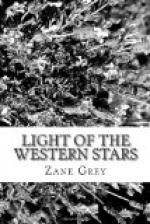She turned back, remembering Link. He was lurching from the car, helmet and goggles thrust back, the gray shade gone from his face, the cool, bright gleam of his eyes disappearing for something warmer.
Senor Montes led Madeline and her cowboys through a hall to a patio, and on through a large room with flooring of rough, bare boards that rattled, into a smaller room full of armed quiet rebels facing an open window.
Madeline scanned the faces of these men, expecting to see Don Carlos. But he was not present. A soldier addressed her in Spanish too swiftly uttered, too voluble for her to translate. But, like Senor Montes, he was gracious and, despite his ragged garb and uncouth appearance, he bore the unmistakable stamp of authority.
Montes directed Madeline’s attention to a man by the window. A loose scarf of vivid red hung from his hand.
“Senora, they were waiting for the sun to set when we arrived,” said Montes. “The signal was about to be given for Senor Stewart’s walk to death.”
“Stewart’s walk!” echoed Madeline.
“Ah, Senora, let me tell you his sentence—the sentence I have had the honor and happiness to revoke for you.”
Stewart had been court-martialed and sentenced according to a Mexican custom observed in cases of brave soldiers to whom honorable and fitting executions were due. His hour had been set for Thursday when the sun had sunk. Upon signal he was to be liberated and was free to walk out into the road, to take any direction he pleased. He knew his sentence; knew that death awaited him, that every possible avenue of escape was blocked by men with rifles ready. But he had not the slightest idea at what moment or from what direction the bullets were to come.
“Senora, we have sent messengers to every squad of waiting soldiers—an order that El Capitan is not to be shot. He is ignorant of his release. I shall give the signal for his freedom.”
Montes was ceremonious, gallant, emotional. Madeline saw his pride, and divined that the situation was one which brought out the vanity, the ostentation, as well as the cruelty of his race. He would keep her in an agony of suspense, let Stewart start upon that terrible walk in ignorance of his freedom. It was the motive of a Spaniard. Suddenly Madeline had a horrible quaking fear that Montes lied, that he meant her to be a witness of Stewart’s execution. But no, the man was honest; he was only barbarous. He would satisfy certain instincts of his nature— sentiment, romance, cruelty—by starting Stewart upon that walk, by watching Stewart’s actions in the face of seeming death, by seeing Madeline’s agony of doubt, fear, pity, love. Almost Madeline felt that she could not endure the situation. She was weak and tottering.




